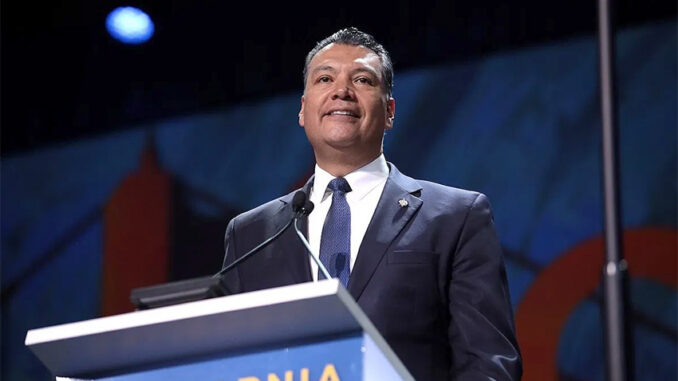
As groups vie for Vice President-elect Kamala Harris’ U.S. Senate seat in California, it’s important to understand this moment in Mexican American history. Since 1850, this population has had to contend with multiple barriers —systemic racism and xenophobia— in an effort to hold it back from achieving its true political and economic potential. Despite these efforts, Mexican Americans have been instrumental in building California, making it the economic powerhouse that it is today. Yet rarely have our contributions been recognized. Latinos make up nearly 40 percent of the state’s population —82 percent of which are Mexican American— and more than 52 percent of the children age 17 and younger. As we think about the future of our state, especially after this disastrous four years, we need to consider the role of this population as we rebuild and plan for a multicultural world.
It is important to remember that Mexicans Americans once held significant sway over the state’s lands and resources. But this influence diminished rapidly due to anti-Mexicanism that identified this population as racially inferior to Anglo Americans and undeserving of citizenship. For most of our state’s history, Mexican Americans came to be regarded as a foreign enemy, inclined to criminality, backwardness, and laziness. These ideas became so ingrained in the body politic, that soon the word “Mexican” itself could not be disentangled from these negative connotations. There is a revealing episode of The Office in which Michael Scott, the office manager, pleads with his only Mexican American employee, Oscar Martinez, to use another self-identifying term as he finds the word “Mexican” too offensive to say out loud.
Mexican Americans have stood up to this oppression time and again, sometimes winning, sometimes not. From individual acts of rebellion and waging legal battles to organizing across labor and civil rights activism, this community has made its voice heard. The Lemon Grove case (1931) and Mendez case (1946) stand out as exemplary efforts by Mexican Americans to bring an end to segregated schools in the state and nation – legal cases that would lay the foundation for Brown in 1954. From Cesar Chavez and Dolores Huerta’s struggles in the fields to the Chicano Movement, this community demanded they have a place at the table and be recognized as true equals. Furthermore, they demanded they be heard on their terms and that history finally record their lives and achievements.
Though much has changed, it appears that old ideas die hard. It’s difficult to imagine that nearly 30 years ago, the state targeted Mexican Americans and Mexican immigrants once again with a series of legislative efforts that identified them as enemies within. Proposition 187 (1994), 227 (1996), and 209 (1996) stand out as the most egregious anti-Mexican pieces of legislation of that period. The support for these efforts did not come from the fringes of the state’s population, as nearly 59 percent of the voters supported it. Linda Hayes, media director for Prop 187, was not shy about her anti-Mexican views. In a letter to the New York Times, she stated “If these trends continued, a Mexico-controlled California could vote to establish Spanish as the sole language of California, 10 million more English-speaking Californians could flee, and there could be a statewide vote to leave the Union and annex California to Mexico.” She really said this.
And then came Donald Trump. The lame duck president used his bully pulpit not to govern, but to inflame racial hatred as a strategy for self-aggrandizement. His minions did not need convincing as they were already primed for his anti-Mexican dog whistles. If publicly calling Mexicans rapists and criminals was not enough, then the mass shooting in El Paso and the separation of thousands of children from their parents, and locking them up in cages, should leave no doubt about where Mexican Americans, and Latinos all, stand before some in society today.
In addition to the growing xenophobia, Latinos voted for Joe Biden —by 78 percent— because the COVID-19 pandemic, the economic downturn, poor access to healthcare services, and lack of employment stability have forced this community into a full-fledged emergency. The Southwest U.S. States in fact became solidly blue, forming a “Mexican Wall.” According to one study, since December 10, some 51,812 Latinos have died of COVID-19. Despite the positive contributions, Latinos have made to the well-being of the state’s economy, the data shows that income distribution, education, housing, and entrepreneurship among this group remains weak—below those of the general population. As the California Latino Economic Institute concludes, these conditions will demand that California leaders and policy makers take specific steps to identify the “needs and opportunities facing Latinos.” If and when we get out of this political and economic malaise, the state will need to direct its overall policies with Latinos specifically in mind.
We’re not asking for handouts, but for proportional and fair treatment. Governor Gavin Newsom must look to the Mexican American community, and to Latinos in general, to fill the spots that are about to open up. This means that if Alex Padilla is tapped for the U.S. senate seat, the vacated secretary of state position, or the state attorney general spot, should be filled by a Mexican American, or Latina/o. The moment is right to increase representation, not diminish it. Mexican Americans and other Latinos have been key allies in the fight to keep our state strong on progressive issues, so let’s not forget this history.



Be the first to comment